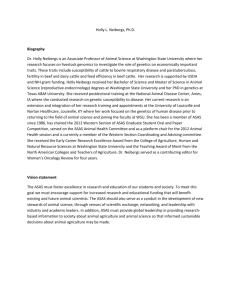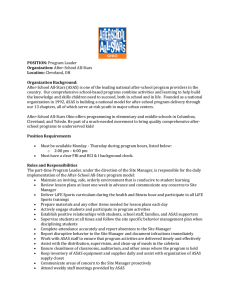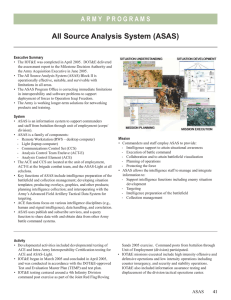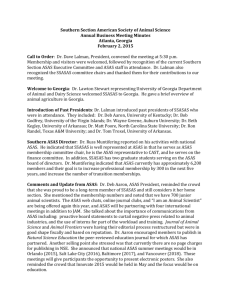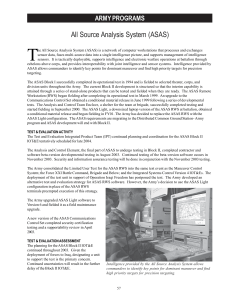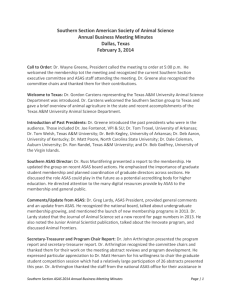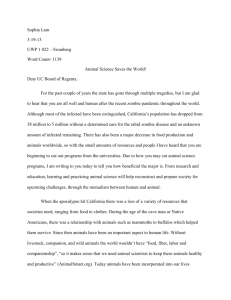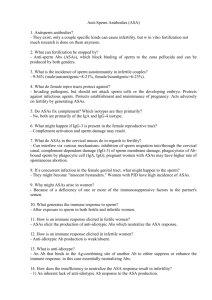As a National Program Leader in Animal Physiology with the USDA
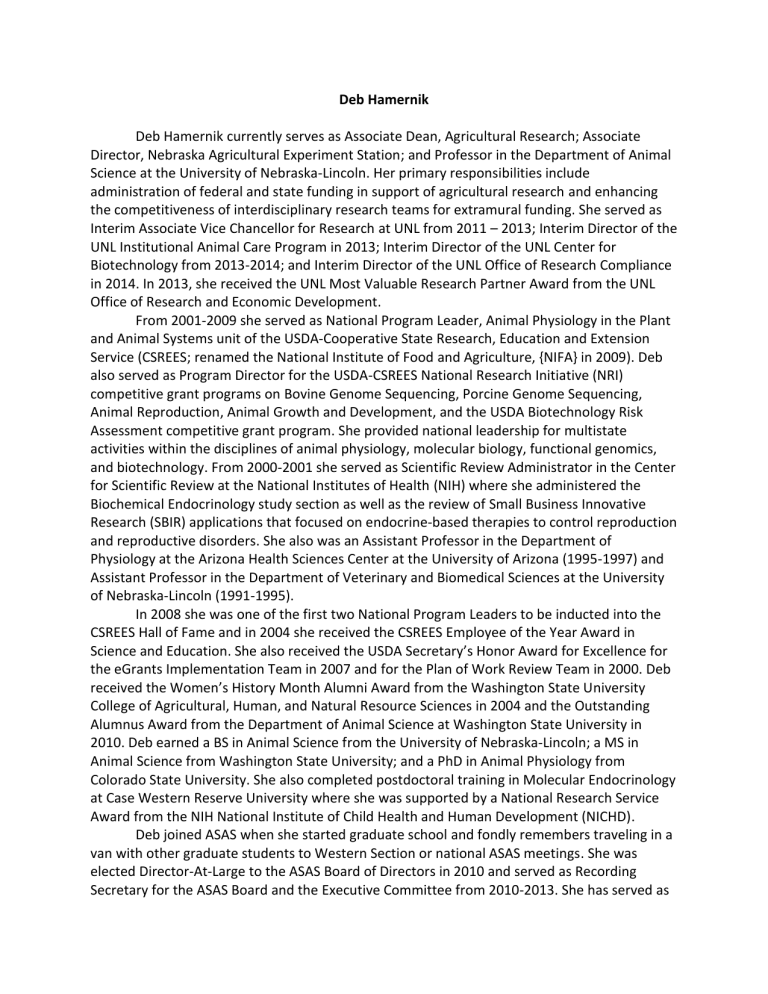
Deb Hamernik
Deb Hamernik currently serves as Associate Dean, Agricultural Research; Associate
Director, Nebraska Agricultural Experiment Station; and Professor in the Department of Animal
Science at the University of Nebraska-Lincoln. Her primary responsibilities include administration of federal and state funding in support of agricultural research and enhancing the competitiveness of interdisciplinary research teams for extramural funding. She served as
Interim Associate Vice Chancellor for Research at UNL from 2011 – 2013; Interim Director of the
UNL Institutional Animal Care Program in 2013; Interim Director of the UNL Center for
Biotechnology from 2013-2014; and Interim Director of the UNL Office of Research Compliance in 2014. In 2013, she received the UNL Most Valuable Research Partner Award from the UNL
Office of Research and Economic Development.
From 2001-2009 she served as National Program Leader, Animal Physiology in the Plant and Animal Systems unit of the USDA-Cooperative State Research, Education and Extension
Service (CSREES; renamed the National Institute of Food and Agriculture, {NIFA} in 2009). Deb also served as Program Director for the USDA-CSREES National Research Initiative (NRI) competitive grant programs on Bovine Genome Sequencing, Porcine Genome Sequencing,
Animal Reproduction, Animal Growth and Development, and the USDA Biotechnology Risk
Assessment competitive grant program. She provided national leadership for multistate activities within the disciplines of animal physiology, molecular biology, functional genomics, and biotechnology. From 2000-2001 she served as Scientific Review Administrator in the Center for Scientific Review at the National Institutes of Health (NIH) where she administered the
Biochemical Endocrinology study section as well as the review of Small Business Innovative
Research (SBIR) applications that focused on endocrine-based therapies to control reproduction and reproductive disorders. She also was an Assistant Professor in the Department of
Physiology at the Arizona Health Sciences Center at the University of Arizona (1995-1997) and
Assistant Professor in the Department of Veterinary and Biomedical Sciences at the University of Nebraska-Lincoln (1991-1995).
In 2008 she was one of the first two National Program Leaders to be inducted into the
CSREES Hall of Fame and in 2004 she received the CSREES Employee of the Year Award in
Science and Education. She also received the USDA Secretary’s Honor Award for Excellence for the eGrants Implementation Team in 2007 and for the Plan of Work Review Team in 2000. Deb received the Women’s History Month Alumni Award from the Washington State University
College of Agricultural, Human, and Natural Resource Sciences in 2004 and the Outstanding
Alumnus Award from the Department of Animal Science at Washington State University in
2010. Deb earned a BS in Animal Science from the University of Nebraska-Lincoln; a MS in
Animal Science from Washington State University; and a PhD in Animal Physiology from
Colorado State University. She also completed postdoctoral training in Molecular Endocrinology at Case Western Reserve University where she was supported by a National Research Service
Award from the NIH National Institute of Child Health and Human Development (NICHD).
Deb joined ASAS when she started graduate school and fondly remembers traveling in a van with other graduate students to Western Section or national ASAS meetings. She was elected Director-At-Large to the ASAS Board of Directors in 2010 and served as Recording
Secretary for the ASAS Board and the Executive Committee from 2010-2013. She has served as
Chair of the ASAS Public Policy Committee since 2011. Under her leadership, the ASAS Public
Policy Committee developed the ASAS Grand Challenges in 2012 and the quarterly Snack and
Fact visits to Washington, DC to disseminate information from Animal Frontiers to
Congressional staffers, federal agencies, and allied animal industry. In February 2013, the ASAS
Public Policy committee began monthly contributions to the ASAS newsletter, Taking Stock DC, and Deb has been a regular contributor to these newsletters. Deb also served as Chair of the
Executive Steering Committee for the Food Animal Integrated Research (FAIR) 2012 national research priority setting workshop and she was a member of the Steering Committee for the first ever Innovate Conference on Funding Livestock Research and Outreach in 2012. She currently serves as one of three ASAS representatives to the FASS Board of Directors and represents ASAS on the FASS Executive Committee and the FASS Science Policy Committee.
Since 2014 she also represents ASAS on the Management Board of Animal Frontiers.
Vision Statement
The future of animal science holds many exciting opportunities as well as many potential challenges. The global demand for animal-sourced foods has never been greater.
Enrollment in undergraduate programs in Animal Science Departments throughout the United
States increased more than 30% between 2005 and 2012 and current enrollments in most departments are at record levels. In addition, the supply of trained workers in Animal Science is not sufficient to keep up with employer demand. However, economic, environmental, and societal issues pose considerable challenges to the livestock industry. In the United States, the average consumer is now at least three generations removed from the farm or ranch and most consumers do not understand where their food comes from. In addition, the public often challenges the ethical basis for the conventional management of farm animals and in at least 10 states legislation has been passed to regulate the care of farm animals.
How can Animal Scientists deliver on our mission to “foster the discovery, sharing and application of scientific knowledge concerning the responsible use of animals to enhance human life and well-being”? We must take every opportunity possible to educate the next generation of consumers and policy makers on the high standards of animal care provided by this industry. We must continue to provide opportunities to discuss the science of companion animals and current issues in the production of animal-sourced foods at the national meetings, in the ASAS journals and in other ASAS publications. We must work with all sectors of the livestock industry to speak with a unified message to policy makers to make them aware of the benefits of research with agricultural animals and the need for increased funding to support research with farm animals in agricultural and biomedical research. ASAS must provide leadership to set national priorities for research, education, and extension. We must work with the federal funding agencies (e.g., the USDA National Institute of Food and Agriculture, National
Institutes of Health, National Science Foundation, and Department of Energy) to ensure that our tax dollars are spent on research with farm animals that will benefit agricultural and biomedical sciences.
Although an Addendum to the ASAS Strategic Plan was developed (FY 2012 – FY 2015), it is now time to engage the ASAS membership in strategic thinking for the next five-year plan for ASAS. This is a tremendous opportunity to engage early career scientists and international
scientists in shaping the future of ASAS. It is also a good time to explore new partnerships with scientific societies to offer new educational programs and new formats for networking and sharing knowledge at the annual meetings or at smaller, more focused meetings. The future success of ASAS will depend on an active membership that is willing to volunteer its time and efforts to advance the animal sciences and the animal industries.
As Animal Scientists, we must also look for new opportunities to communicate with the public, news media, and policy makers to demonstrate that we share the same values with regard to safe and nutritious animal-sourced foods, animal care, and environmental stewardship. Messages that focus on shared values will help build trust with the public. Animal
Scientists are viewed as credible sources of information and can use their credentials along with new social media platforms to deliver scientific and technical information to the public during discussions of issues associated with the production of animal-sourced foods.
I am honored and humbled to be considered for this leadership role in ASAS. I welcome the opportunity to use the insights gained during my 11+ years with the federal government and 6+ years as an administrator of agricultural research at a land-grant university to help the
ASAS further strengthen our scientific voice for farm animals and companion animals; to prepare trainees for successful careers in animal science; and to ensure that ASAS remains a diverse, financially stable, and progressive organization to better serve the needs of it’s U.S. and international members in the 21 st century.
